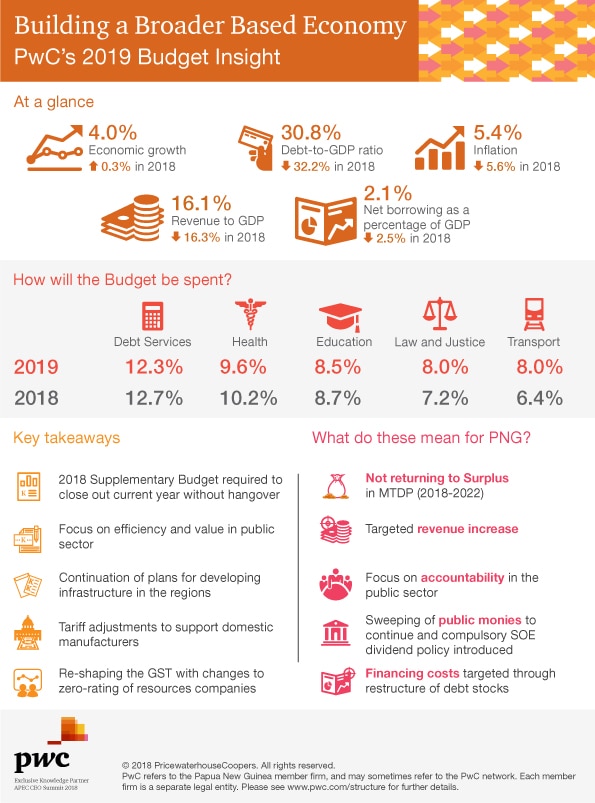Budget 2019: Building a broader based economy
The 2019 National Budget — Building a Broader Based Economy — is the second for the Deputy Prime Minister and Treasurer, the Honourable Charles Abel, and is the culmination of the process that we have seen over the past months since the election and the Alotau Accord II, the 100 Day Plan and the subsequent 25 Point Plan.
The 2019 Budget is framed by the poor headline results from the 2018 Supplementary Budget, particularly the:
- drop in GDP from 3.0% in 2017 to 0.3% in 2018. This result is driven overwhelmingly by the February 2018 earthquake and the corresponding shutdown in PNG’s mines and gas LNG production facilities
- explosion in unfunded public sector compensation.
With this as a backdrop, key outcomes from the 2019 Budget (with comparisons to the 2018 Supplementary Budget) include:
- Inflation — 5.4% (vs 5.6% in 2018)
- Economic growth — 4.0% (vs 0.3% in 2018)
- Government revenue as a percentage of GDP — 16.1% (vs 16.3% in 2018)
- Net borrowing as a percentage of GDP — -2.1% (vs -2.3% in 2018).
With this as a start, the 2019 Budget reflects the continued goal of reshaping:
- the economy, with a focus on supporting investment into the non-resources sector and ensuring that public expenditure supports a broader economic base
- the Budget, with a focus on tackling the spike in public sector employment costs that emerged during 2018, and reshaping the debt profile away from higher domestic debt sources to cheaper longer term international debt sources.
There will be continuing pressure on some stakeholders out of this Budget, with:
- central government agencies and provincial governments under continued pressure to remit surplus funds and better account for the execution of their budgets
- the public service challenged to maintain a lid on staff costs.
Commenting on last year’s Budget we noted that the issue deferred was that of reigning in government debt. The Government has sought to address the cost of debt, which provides some medium term budgetary relief, and projections show the debt-to-GDP ratio of getting within the 30% target by 2022.
Here are the key things you need to know about the 2019 Budget:




Download PwC's 2019 Budget Commentary